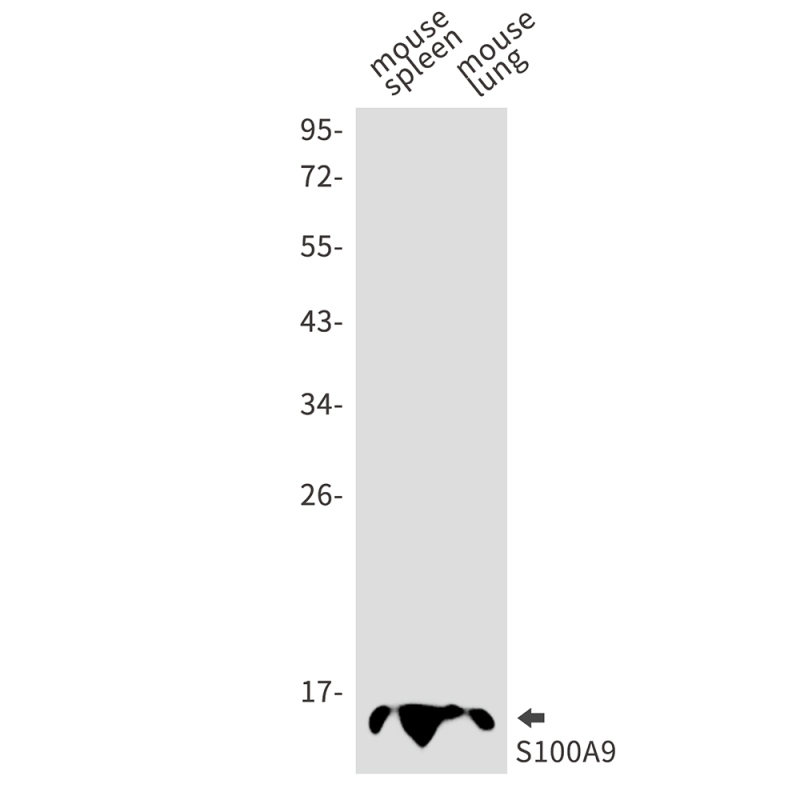
| WB | 1/500-1/1000 | Human,Mouse,Rat |
| IF | 咨询技术 | Human,Mouse,Rat |
| IHC | 1/50-1/100 | Human,Mouse,Rat |
| ICC | 1/50-1/200 | Human,Mouse,Rat |
| FCM | 咨询技术 | Human,Mouse,Rat |
| Elisa | 咨询技术 | Human,Mouse,Rat |
| Aliases | S100 alpha9; Calgranulin-B; Leukocyte L1 complex heavy chain |
| Entrez GeneID | 20202 |
| WB Predicted band size | Calculated MW: 13 kDa; Observed MW: 13 kDa |
| Host/Isotype | Rabbit IgG |
| Antibody Type | Primary antibody |
| Storage | Store at 4°C short term. Aliquot and store at -20°C long term. Avoid freeze/thaw cycles. |
| Species Reactivity | Mouse |
| Immunogen | Recombinant protein of mouse S100A9 |
| Formulation | Purified antibody in TBS with 0.05% sodium azide,0.05%BSA and 50% glycerol. |
+ +
以下是关于S100A9抗体的3篇参考文献概览,涵盖其在疾病机制、诊断及治疗中的应用:
---
1. **文献名称**:*S100A9 in Inflammation and Cancer: A Novel Biomarker and Therapeutic Target*
**作者**:Wang H, et al.
**摘要**:该研究探讨了S100A9蛋白在慢性炎症和肿瘤微环境中的调控作用,开发了一种特异性单克隆抗体用于检测S100A9在结直肠癌组织中的表达,并验证其作为预后标志物的潜力。
2. **文献名称**:*Targeting S100A9 with a Neutralizing Antibody Attenuates Neutrophil-Dependent Inflammation in Autoimmune Arthritis*
**作者**:Vogl T, et al.
**摘要**:研究团队通过中和性抗体抑制S100A9蛋白的功能,发现其可显著减少类风湿性关节炎模型中的中性粒细胞浸润和炎性因子释放,为自身免疫疾病治疗提供新策略。
3. **文献名称**:*Development of a High-Affinity Anti-S100A9 Antibody for Non-Invasive Imaging of Atherosclerosis*
**作者**:Leclercq A, et al.
**摘要**:该文献报道了一种高亲和力S100A9抗体的开发,结合分子影像技术成功实现了动脉粥样硬化斑块的无创可视化,证明其在心血管疾病早期诊断中的价值。
---
以上文献均聚焦于S100A9抗体的开发或应用,涉及癌症、炎症性疾病和心血管疾病领域,强调了其作为生物标志物或治疗工具的潜力。
The S100A9 antibody targets the S100A9 protein, a member of the S100 calcium-binding protein family. S100A9. also known as calgranulin B or MRP14. is primarily expressed in neutrophils, monocytes, and activated macrophages. It forms heterodimers with S100A8 (calgranulin A), creating the calprotectin complex (S100A8/A9), which plays critical roles in innate immunity, inflammation, and cellular regulation. S100A9 is involved in pro-inflammatory responses by acting as a damage-associated molecular pattern (DAMP) molecule, activating Toll-like receptors (e.g., TLR4) and promoting cytokine release. Dysregulation of S100A9 is linked to chronic inflammatory diseases (e.g., rheumatoid arthritis, inflammatory bowel disease), cancer progression, and neurodegenerative disorders.
The S100A9 antibody is widely used in research to detect and quantify S100A9 expression in tissues or biological fluids via techniques like immunohistochemistry, Western blotting, and ELISA. It aids in studying inflammatory pathways, tumor microenvironment dynamics, and disease biomarkers. Commercially available antibodies are typically validated for specificity, with clones varying across host species (e.g., rabbit, mouse) and applications. Recent studies also explore S100A9 as a therapeutic target, highlighting its antibody’s potential in diagnostics and drug development. Proper controls are essential to avoid cross-reactivity with other S100 proteins due to structural similarities.
×